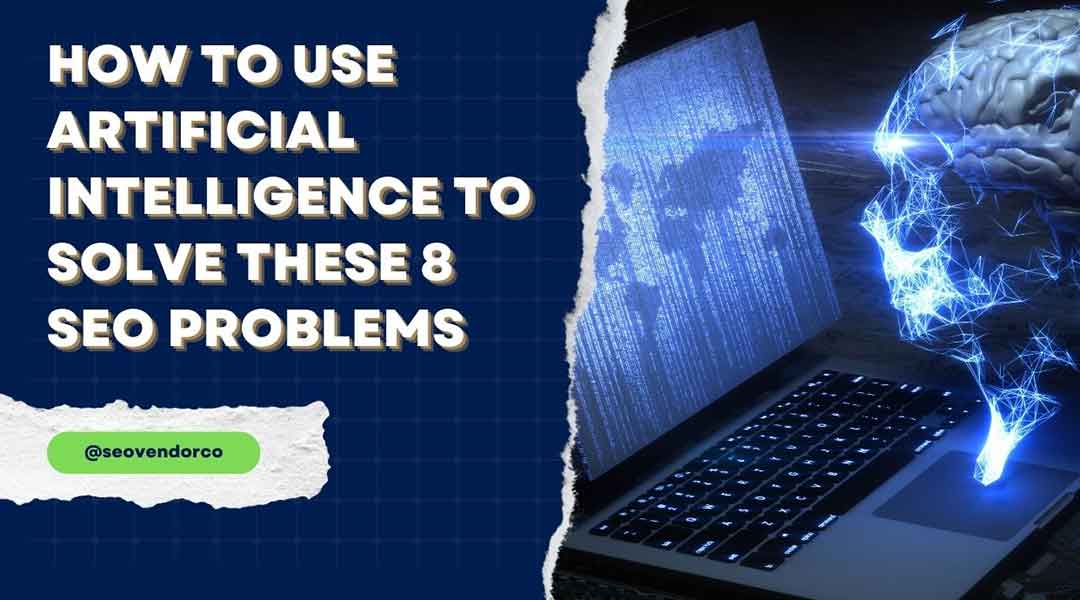Are you struggling to stay ahead in the ever-changing world of SEO? Updates and the constant need to refine content for search intent—all while keeping tabs on performance—have become an exhausting affair for businesses. Staying on top of your website’s performance can feel like a constant uphill battle, with the formula for success seemingly changing by the minute.
Table of Contents
This is where artificial intelligence steps in as a game-changer. By marrying AI with SEO know-how, businesses can engineer a lean, mean optimization machine that unearths market gaps, tweaks its tactics, and produces results that hit the bottom line. Wondering how can I use AI tools to identify and fix SEO issues? Say goodbye to educated guesses—these solutions give you data-driven insights to pinpoint where you’re falling short, suggest winning keyword strategies, and then fine-tune your content for maximum impact.
Getting bogged down in SEO? Say goodbye to search engine stress—and hello to optimization stardom—with cutting-edge tools that turn pain points into hotspots for success. Let’s begin with a critical step many struggle with: keyword research.
SEO Problem #1: Keyword Research and Optimization
Keyword research and optimization stands as a foundational pillar in SEO. You often find yourself spending hours identifying words that not only align with your audience’s intent but also keep you ahead in the game. This challenge intensifies with the need to predict emerging search terms before they become mainstream.
AI transforms this daunting task into an efficient process. Tools powered by artificial intelligence, such as SEMrush and Ahrefs, conduct deep dives into search trends, competitive analysis, and user behavior patterns. They offer precise insights about high-value keywords tailored for your content strategy.
One breakthrough feature within these AI tools is predictive analytics. Predictive insights enable you to spot long-tail keywords and upcoming topics well before your competition does, giving you a strategic edge. Moreover, keyword gap analysis has never been simpler; compare what keywords are driving traffic to competitors’ sites versus yours seamlessly using AI software options currently available on the market.
It reveals untapped opportunities where additional emphasis on certain phrases could significantly boost visibility online. By leveraging advanced technology effectively, AI tools can help business owners conquer common issues surrounding keyword research. This ensures relevant connections with evolving user needs effortlessly.
SEO Problem #2: Content Creation and Optimization
Creating high-quality, SEO-optimized content demands both time and creativity. You often grapple with producing engaging material consistently and tweaking it to meet search engine standards.
- Generating Ideas: AI writing assistants come into play here by suggesting diverse topics that resonate with your audience’s interests. These tools scan the web for trending subjects within your niche, offering a goldmine of inspiration. They help you jumpstart the creation process without the usual brainstorming hurdles, ensuring content stays fresh and relevant.
- Enhancing Readability: Once you’ve drafted an article or blog post, AI can critique its readability and SEO aspects needing attention. These tools examine sentence length, keyword distribution, and overall structure to suggest modifications that boost clarity for readers while appealing to search algorithms. By adhering to these suggestions, your content not only captivates but also climbs up in rankings—it strikes the fine balance between user-friendly language and optimization requirements.
- Content Personalization: Lastly, AI specializes in tailoring articles based on individual reading habits and preferences. Understanding various audience segments allows these intelligent systems to recommend adjustments, ensuring each piece speaks directly to targeted users’ interests or needs. This precise alignment increases engagement significantly as visitors perceive value in custom-tailored insights anticipated just for them, turning first-time readers into loyal followers effortlessly.
SEO Problem #3: Technical SEO and Site Audits
Technical SEO and site audits can uncover hidden issues that hurt your site’s performance. AI simplifies this complex task, identifying problems quickly.
- AI-Powered Site Audits: Tools automate the discovery of technical flaws like missing meta tags or duplicate content. They scan every corner of a website efficiently. This process reveals critical errors, such as crawl issues, that could prevent indexing. Fixing these ensures search engines read your site correctly.
- Automated Recommendations: AI doesn’t just spot problems; it offers solutions, too, for improving speed and overall functionality. These suggestions prioritize fixes based on their impact, guiding you effectively through optimization steps. This proactive approach helps address issues before they significantly affect rankings. It translates into better user experiences and potentially higher search engine positions.
- A Mobile Optimization: AI optimizes websites for mobile users crucially because Google values mobile-first indexing highly. By testing various elements, AI guarantees fluidity across devices, greatly enhancing visitor satisfaction. Following its guidelines boosts visibility since many searches now happen on smartphones and tablets, which improves traffic considerably from these sources.
SEO Problem #4: Understanding Search Intent
Grasping the nuances of search intent is a puzzle many fail to solve. Get your audience’s goals wrong, and your content will struggle to gain traction, sinking like a stone in search engine rankings.
- Search Intent Analysis: AI tools have flipped the script on understanding user queries, which are now organized by the invisible threads of purpose that drive them. These categories include informational, transactional, or navigational intentions. With AI on your side, your website’s content gets an instant upgrade, elevating it to precisely match what Internet users are hunting for. A well-aligned online presence is like a golden ticket to higher search engine rankings.
- Natural Language Processing (NLP): The use of NLP technologies such as BERT and RankBrain has been pivotal in deciphering complex user inquiries. They snoop out the details that often get lost in translation, piecing together the hidden meaning behind a user’s search query. Armed with this knowledge, you can pinpoint exactly what’s missing from your current content and generate new material that covers those previously overlooked bases. As a result, it enhances user engagement since visitors find precisely what they’re looking for swiftly.
- Content Tailoring: Forward-thinking companies have cracked the code: they tap AI’s hidden patterns to weave customer preferences into their product fabric, producing spot-on matches. For instance, generating detailed guides in response to informational searches or crafting compelling product pages optimized for transactional terms ensures relevance. The secret to SEO success lies in organizing your content just so—these tools show you how to craft precise responses that resonate with users.
SEO Problem #5: Link Building and Outreach
Link building and outreach can challenge many businesses due to the time it requires and the need for strong relationships. AI offers solutions to make this process more efficient.
- Link Analysis: AI tools evaluate competitor backlinks, showing you where they excel. They highlight relevant opportunities based on site authority and content relevance. This saves hours of manual research, guiding your strategy with precision insights.
- Automated Outreach: Outreach becomes less burdensome with AI-driven platforms managing emails and follow-ups efficiently. These systems personalize messages at scale, improving response rates from potential link partners without human errors or oversights in communication tactics.
- Content Creation for Link Acquisition: Producing content that others want to share is crucial for link building. AI identifies topics trending within your niche. Then, it optimizes your articles or blog posts, ensuring they’re attractive to share. This naturally makes your website a magnet for quality links over time. By leveraging these AI capabilities, businesses streamline their approach toward cultivating valuable backlinks and forge better connections online.
SEO Problem #6: Monitoring SEO Performance and Reporting
Keeping track of your website’s SEO success is tough, and making sense of the data to improve future actions can be even tougher. But AI tools are here to simplify this aspect.
- Automated Performance Tracking simplifies the monitoring process. Tools powered by AI offer insights into organic traffic movements and how keywords perform over time without manual input.
- Predictive Analytics goes beyond current performance metrics. It uses past data to predict future trends, allowing marketers to adjust their strategies before problems arise or opportunities pass them by.
- Customizable Reports transform raw data into easy-to-understand visuals. These reports not only pinpoint where changes need to be made but also save valuable time in analyzing and reporting on SEO progress.
With these advances, businesses can shift focus from tedious tracking tasks to fine-tuning their overall strategy for better results online.
Challenges and Considerations When Using AI in SEO
When using AI for SEO, the balance between quality and quantity becomes crucial. Even though AI can speed up content creation, you need to keep an eye on maintaining high-quality standards. Pairing AI’s efficiency with human creativity ensures that your content stands out.
AI depends heavily on data; thus, its effectiveness ties directly to the accuracy of this data. If your information is off-mark, your strategies might not hit their targets effectively due to false insights generated by incorrect data inputs. Ethical concerns also play a significant role when integrating AI into SEO practices.
Using artificial intelligence responsibly prevents generating misleading or low-value content that could harm trust both from users and search engines alike. Ethically driven practices in employing AI fosters reliability and credibility in the long run. Remember to blend technology with genuine oversight and ethical considerations for the best outcomes in SEO endeavors.
Using artificial intelligence smartly tackles common SEO challenges. AI helps analyze massive data chunks quickly, finding patterns we might miss. It boosts your site’s ranking by optimizing keywords and backlinks more efficiently than manual efforts could ever achieve.
Plus, it personalizes user experience on a level that significantly ups engagement rates. Remember, though, that while AI is a powerful tool for enhancing your SEO strategies, blending its insights with human creativity ensures the best outcomes. Trust in this blend to keep you ahead in search engine rankings.










One comment
Pingback: How to Use Artificial Intelligence to Solve These 8 SEO Problems – SEO Vendor Services
Comments are closed.